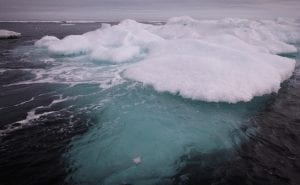Today, Shell Oil announced it will postpone efforts to drill for oil in the Arctic Ocean after the company’s oil spill response barge failed another round of testing. The company says it will resume operations next year.
The decision to halt operations comes a week after the company began preparatory drilling in the Chukchi Sea – and was forced to suspend operations just one day later due to a massive ice pack covering approximately 360 square miles drifting toward the site.
The ongoing problems with the company’s oil containment barge, a critical piece of oil spill response equipment, is just the latest in a series of setbacks in Shell’s quest to tap oil under the Arctic Ocean. These problems raise serious questions about its preparedness to drill in some of the harshest conditions on the planet.
Though Shell has vowed to spend the remainder of the season drilling as many “top holes” as possible in order to quickly resume drilling operations next year, the most glaring challenges will not dissipate. As detailed in the Center for American Progress report, Putting a Freeze on Arctic Ocean Drilling: America’s Inability to Respond to an Oil Spill in the Arctic, the dearth of supporting infrastructure throughout Alaska’s North Slope — including ports, roads, railroads, and permanent Coast Guard facilities — coupled with the lack of sound science and extremely volatile conditions make offshore operations extremely difficult and hazardous. The remote location, harsh and unpredictable conditions, and absence of proven clean-up technologies designed for Arctic conditions would make large-scale response efforts nearly impossible.
Citing many of these challenges and deficiencies, insurance giant Lloyd’s of London issued a report earlier this year warning that responding to an oil spill in a region that is “highly sensitive to damage” would present “multiple obstacles, which together constitute a unique and hard-to-manage risk.” Soon after, German bank WestLB announced it would not provide financing to any offshore oil or gas drilling in the region, saying the “risks and costs are simply too high.”
The prospect of drilling in Alaska’s Arctic Ocean – and the threat of an oil spill – has drawn the concerns of Alaska Natives who depend on the Arctic Ocean for their livelihood. In addition, the U.S. Coast Guard and the scientific community have expressed doubts about the lack of knowledge about oil spills in the region.
After five years and $4.5 billion invested in Arctic Ocean drilling, Shell’s delayed drilling plan is an illustration of how difficult and dangerous it is to drill for oil in the world’s last great frontier.
Watch our recent documentary on these challenges in the Arctic:
Kiley Kroh is Associate Director of Oceans Communications at the Center for American Progress.
This article was originally published on Climate Progress – thinkprogress.org/climate. Reproduced with permission.










